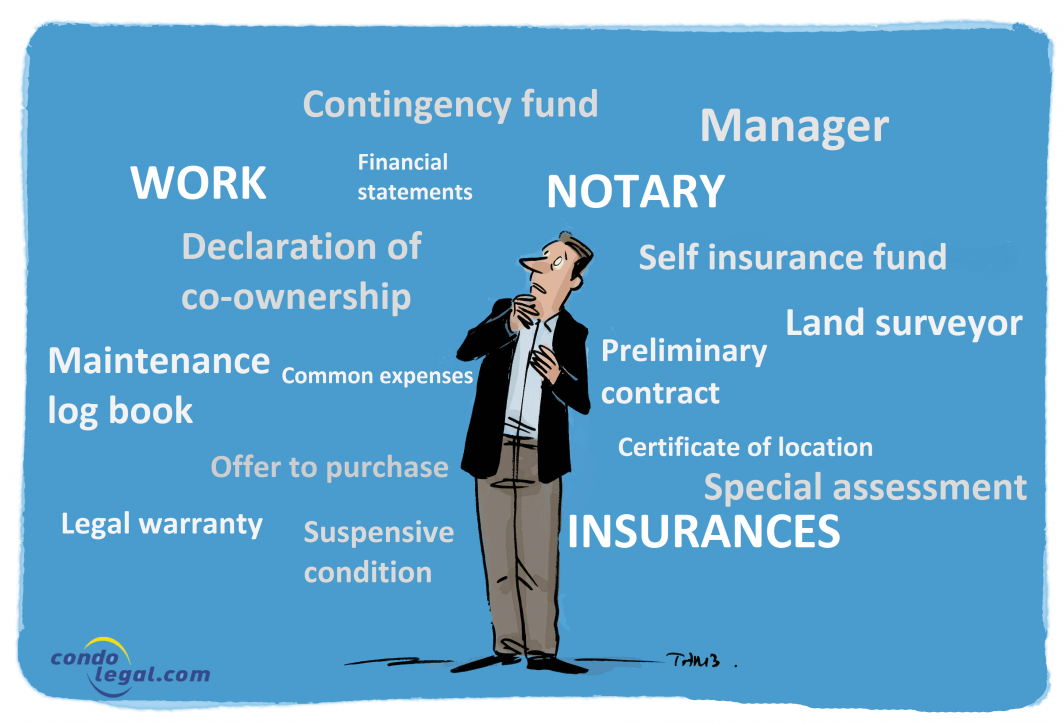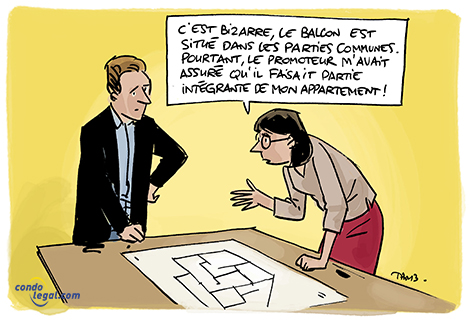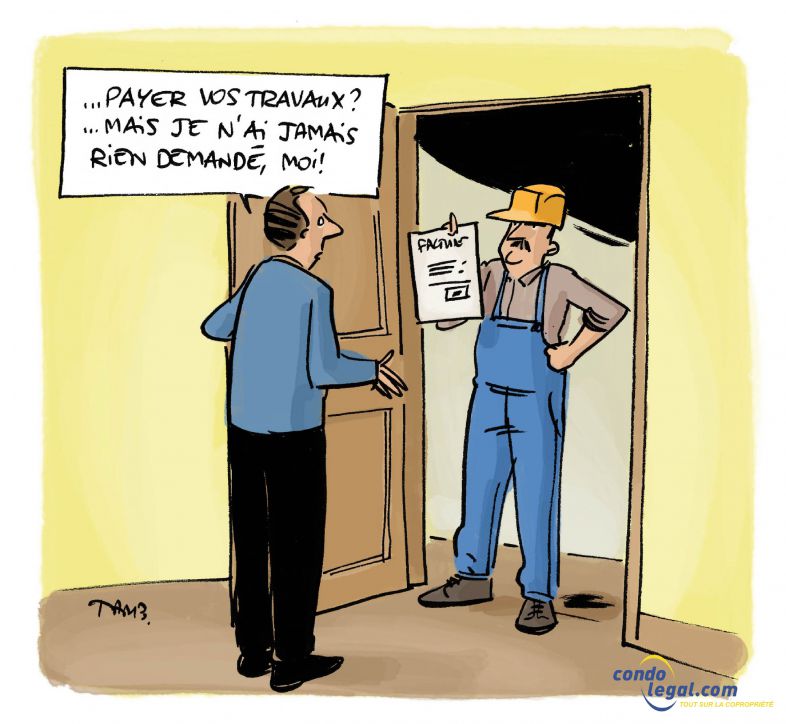
When you buy in a newly built divided co-ownership, a portion of the fractions of the building (apartment, parking or storage space, etc.), or even all, can be the subject of a notice of legal hypothec of construction. The Civil Code of Quebec introduced this hypothec in order to protect the persons who participated in its construction or renovation (architect, engineer, supplier of materials, workman, construction contractor or subcontractor) so that they can be reimbursed for work and services carried out on an immovable.
As a buyer, will you be required to pay the developer's debts if it defaults on its construction creditors? If so, will the amounts claimed be distributed among all co-owners? And what will happen if they refuse to pay?
What is a legal construction hypothec?
Article 2726 of the Civil Code of Quebec provides that a legal hypothec is acquired " in favour of the persons having taken part in the construction or renovation of an immovable ". This right is thus granted to contractors, subcontractors (e.g. plumber, electrician and plasterer), supplier of materials, workman, engineers and architects. It is born at the time of the formation of the contract. The legal hypothec secures the increase in value given to the immovable by the work, materials or services supplied or prepared for the work. Minor maintenance work does not qualify for this mortgage unless it contributes to the increase in the value of the building.
When the contract describing the services to be rendered has not been concluded directly with the co-owners (e.g. the syndicate for work in the common portions), the exercise of this right requires, with the exception of the workman, that the said contract has been previously denounced to the co-owners. The implementation of this obligation of the contractor is delicate, when it comes from a contract after the promoter has sold a certain number of units. The Court of Appeal has, in the past, ordered the cancellation of a published legal hypothec on units sold after determining that the date of agreement of will between the developer and the contractor was subsequent to the sales of a significant number of apartments.
In addition, the notice of disclosure is a writing which must inform the owner that the contractor has designated a third party as a subcontractor or supplier of materials. This notice briefly describes the contract obtained, its price, the place of work and the intention to avail oneself of the legal hypothec. Otherwise, the mortgage is invalid or is limited to the works, materials or services that follow the written denunciation of the contract to the co-owners.
A strict procedure
Legal construction hypothecs and their publication are subject to strict rules. They remain by publication on the building that has undergone work (at the Land Registry Office) and the service by bailiff of a notice of preservation, within 30 days after all the construction work of an entire project has been substantially carried out, that is to say within 30 days after the work has been completed.
In addition, the beneficiary of this right must have published, within six months after the end of the work, a prior notice of exercise of a hypothecary right that he has previously served on the owner and his co-contractor, if it is not the same person. If these conditions are not met, the legal hypothec is extinguished.
Splitting the legal hypothec
Article 1051 of the Civil Code of Quebec states that the legal hypothec of construction, which is registered in relation to work carried out throughout a co-ownership, is shared between the fractions held by each of the co-owners. This division varies according to the relative value specific to each fraction, or by virtue of other calculations that could be considered. However, the legal hypothec that arises after the publication of the declaration of co-ownership will not be divided according to article 1051 of the Civil Code of Quebec. The beneficiary of such a mortgage must enter a notice breaking down the capital gains made to each fraction. Each co-owner is only kept up to the added value given to his unit by the work. After paying their share of a legal construction hypothec, the co-owners can then have it written off from their fraction.
Judicial recourse
If the co-owners covered by this legal construction hypothec refuse to pay the required sums of money, the creditor (e.g. contractor, subcontractor) may exercise a recourse against each of them, up to the amount attributable to their share. By exercising his mortgage right, he may request either the sale under control of justice, or the taking in payment of the targeted apartment, thus dispossessing the owner to whom it belongs.
A formidable risk
The legal hypothec of the construction exists by itself during the duration of the work and, for it to be preserved, a notice must be published during the 30 days following the completion of the work. It may exist when the declaration is registered, even if it is not published. This is why this risk is practically impossible to detect by the notary who must instrument your purchase.
You should know that the work may have been completed in your unit at the time you acquired it, but that there is still work to be done elsewhere in the building. For example, the pool may be under construction, while the installation of carpets on some floors is planned at a later date. It then becomes difficult, in such circumstances, to anticipate the date of completion of the work.
The consequences of publishing a notice of legal hypothec are likely to be dramatic. Thanks to the mortgage remedies available to him, his beneficiary can ask that your apartment be sold in court, in the event that you do not pay his claim. He may also ask the court to be declared the owner of the premises, without having to compensate you, even if your apartment has a much higher value than that of the protected claim.
A major irritant for mortgage lenders
This legal construction hypothec could put you in default with respect to your hypothecary creditor, who would ask for the repayment of the loan he has granted you, failing to have this notice written off yourself within a given period. The holder of a legal construction hypothec acquires, for the capital gain granted by these works, a right of first rank or higher than that of the mortgage lender on the immovable you own, thus putting at risk the debt of your mortgage lender.
Conditions of validity
In principle, only a contractor or subcontractor holding an appropriate licence issued by the Régie du bâtiment du Québec may claim the right to benefit from this guarantee. Thus, the Building Act provides the possibility, for the owner of an immovable charged with a legal construction hypothec, to have the hypothec of a contractor who does not hold such a licence struck off. However, an application for radiation cannot be received if it is established that the owner knew that the contractor did not hold it.
 WHAT YOU SHOULD KNOW ! Some title insurance companies offer, to purchasers of new apartments, insurance coverage to protect them in the event of the registration of a legal hypothec of construction, for work carried out before or after your purchase, under reserve that such work has already been contracted before the effective date of coming into force of the policy. For more information on the legal hypothec of construction and on the insurance coverages available, click here.
WHAT YOU SHOULD KNOW ! Some title insurance companies offer, to purchasers of new apartments, insurance coverage to protect them in the event of the registration of a legal hypothec of construction, for work carried out before or after your purchase, under reserve that such work has already been contracted before the effective date of coming into force of the policy. For more information on the legal hypothec of construction and on the insurance coverages available, click here.
 WHAT TO KEEP IN MIND : The right of stakeholders in the construction industry, namely the persons who participated in the construction or renovation of an immovable, to register a legal hypothec is an exceptional privilege. Indeed, this mortgage is predominant because in case of default and, ultimately, the sale of the building, the construction stakeholder can be paid in priority even before the mortgage creditor of the co-owner!
WHAT TO KEEP IN MIND : The right of stakeholders in the construction industry, namely the persons who participated in the construction or renovation of an immovable, to register a legal hypothec is an exceptional privilege. Indeed, this mortgage is predominant because in case of default and, ultimately, the sale of the building, the construction stakeholder can be paid in priority even before the mortgage creditor of the co-owner!
 WARNING ! The notice of a legal hypothec can be published not only against the fractions (e.g. apartments) that remain the property of the developer, but also against those that he has sold to buyers, in this case you. Each co-owner may thus be required to pay his share of a legal hypothec of the construction. Once done, everyone will then be able to have it removed from their private portion.
WARNING ! The notice of a legal hypothec can be published not only against the fractions (e.g. apartments) that remain the property of the developer, but also against those that he has sold to buyers, in this case you. Each co-owner may thus be required to pay his share of a legal hypothec of the construction. Once done, everyone will then be able to have it removed from their private portion.






